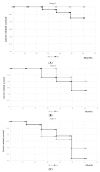Comparison of Oncologic Outcomes in Laparoscopic versus Open Surgery for Non-Metastatic Colorectal Cancer: Personal Experience in a Single Institution
- PMID: 31248135
- PMCID: PMC6616913
- DOI: 10.3390/jcm8060875
Comparison of Oncologic Outcomes in Laparoscopic versus Open Surgery for Non-Metastatic Colorectal Cancer: Personal Experience in a Single Institution
Abstract
The oncologic merits of the laparoscopic technique for colorectal cancer surgery remain debatable. Eligible patients with non-metastatic colorectal cancer who were scheduled for an elective resection by one surgeon in a medical institution were randomized to either laparoscopic or open surgery. During this period, a total of 188 patients received laparoscopic surgery and the other 163 patients received the open approach. The primary endpoint was cancer-free five-year survival after operative treatment, and the secondary endpoint was the tumor recurrence incidence. Besides, surgical complications were also compared. There was no statistically significant difference between open and laparoscopic groups regarding the average number of lymph nodes dissected, ileus, anastomosis leakage, overall mortality rate, cancer recurrence rate, or cancer-free five-year survival. Even though performing a laparoscopic approach used a significantly longer operation time, this technique was more effective for colorectal cancer treatment in terms of shorter hospital stay and less blood loss. Meanwhile, fewer patients receiving the laparoscopic approach developed postoperative urinary tract infection, wound infection, or pneumonia, which reached statistical significance. For non-metastatic colorectal cancer patients, laparoscopic surgery resulted in better short-term outcomes, whether in several surgical complications and intra-operative blood loss. Though there was no significant statistical difference in terms of cancer-free five-year survival and tumor recurrence, it is strongly recommended that patients undergo laparoscopic surgery if not contraindicated.
Keywords: laparoscopic; non-metastatic colorectal cancer; oncologic outcome; open surgery; single surgeon experience; surgical complication.
Conflict of interest statement
The authors declare no conflict of interest.
Figures




Similar articles
-
Feasibility and outcomes of surgical therapy in very elderly patients with colorectal cancer.Surg Laparosc Endosc Percutan Tech. 2014 Feb;24(1):85-8. doi: 10.1097/SLE.0b013e3182a83477. Surg Laparosc Endosc Percutan Tech. 2014. PMID: 24487164
-
[Oncologic safety of laparoscopic surgery in radical resection for different stage rectal cancer].Zhonghua Wei Chang Wai Ke Za Zhi. 2015 Jun;18(6):568-72. Zhonghua Wei Chang Wai Ke Za Zhi. 2015. PMID: 26108770 Chinese.
-
Completely laparoscopic versus open total gastrectomy in stage I-III/C gastric cancer: safety, efficacy and five-year oncologic outcome.Minerva Chir. 2012 Aug;67(4):319-26. Minerva Chir. 2012. PMID: 23022756
-
Should all distal pancreatectomies be performed laparoscopically?Adv Surg. 2009;43:283-300. doi: 10.1016/j.yasu.2009.02.013. Adv Surg. 2009. PMID: 19845186 Review.
-
[Meta-analysis of laparoscopic versus open surgery for palliative resection of the primary tumor in stage IV colorectal cancer].Zhonghua Wei Chang Wai Ke Za Zhi. 2020 Jun 25;23(6):589-596. doi: 10.3760/cma.j.cn.441530-20190619-00247. Zhonghua Wei Chang Wai Ke Za Zhi. 2020. PMID: 32521980 Chinese.
Cited by
-
Enteric-Coated Strategies in Colorectal Cancer Nanoparticle Drug Delivery System.Drug Des Devel Ther. 2020 Oct 21;14:4387-4405. doi: 10.2147/DDDT.S273612. eCollection 2020. Drug Des Devel Ther. 2020. PMID: 33116423 Free PMC article. Review.
-
Breaking Myths: Comparable Outcomes in Lymph Node Analysis Across Surgical Methods.Cancers (Basel). 2025 Apr 14;17(8):1312. doi: 10.3390/cancers17081312. Cancers (Basel). 2025. PMID: 40282488 Free PMC article.
-
Video-Laparoscopic versus Open Surgery in Obese Patients with Colorectal Cancer: A Propensity Score Matching Study.Cancers (Basel). 2021 Apr 13;13(8):1844. doi: 10.3390/cancers13081844. Cancers (Basel). 2021. PMID: 33924366 Free PMC article.
-
Resection margins, lymph node harvest and 3 year survival in open and laparoscopic colorectal cancer surgery; a prospective cohort study.Discov Oncol. 2023 Dec 3;14(1):222. doi: 10.1007/s12672-023-00824-x. Discov Oncol. 2023. PMID: 38044392 Free PMC article.
-
Special Issue on Clinical Medicine for Healthcare and Sustainability.J Clin Med. 2020 Jul 13;9(7):2206. doi: 10.3390/jcm9072206. J Clin Med. 2020. PMID: 32668562 Free PMC article.
References
-
- Guillou P.J., Quirke P., Thorpe H., Walker J., Jayne D.G., Smith A.M., Heath R.M., Brown J.M., MRC CLASICC Trial Group Short-term endpoints of conventional versus laparoscopic-assisted surgery in patients with colorectal cancer (MRC CLASICC trial): Multicentre, randomised controlled trial. Lancet. 2005;365:1718–1726. doi: 10.1016/S0140-6736(05)66545-2. - DOI - PubMed
Grants and funding
LinkOut - more resources
Full Text Sources

